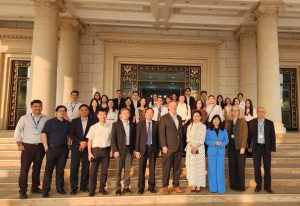From Offline to Online: Alteration of Teaching-Learning Strategies in Covid-19 Pandemic in Vietnam
Abstract
This paper reveals the evolution in teaching and learning in Vietnam in the context of the Covid-19 pandemic. Like many countries in the world, Vietnam suffered from this global crisis in many senses. The common problem is that the unexpected impact of Covid-19 led to the ill-prepared situation in teaching-learning strategies. The authors would reveal how Vietnam adapted to this sudden change and found it quite successful despite facing vaious challenges. On this ground, the authors discuss and advocate the future of online teaching-learning in this country.
Introduction
Since the outbreak of Covid-19 in Wuhan, the pandemic has spread globally and impacted many aspects of our daily lives (Franchi, 2020). For most people, the virus negatively affected human life in an unprecedented way (Franchi, 2020). Like other countries in the world, Vietnam applied various containment measures to cope with the pandemic, including isolation, contact tracing and quarantine, physical distancing, hygiene measures, and lockdown (Thao, Ha, Phuong & Minh, 2021). From the first outbreak in the country, the Vietnamese Government has dictated to isolate, track, and restrict people from the epidemic zone, implement medical declarations (Prime Minister, 2020) and control stricter (close) the border (Prime Minister, 2020). To be specific, Vietnam has used widely social distancing to protect themselves and others from the spread of Covid-19 (World Health Organization, 2021). That makes Vietnam controlled the epidemic well with “extreme but sensible” measures (Jones, 2020; Quach & Hoang, 2020).
Nevertheless, this measure struck hard the economy. The above mentioned containment measures influenced aviation, service industry, and tourism in Vietnam, then trade and investment, followed by manufacturing disruption (B&Company Vietnam & BEAN Survey team, 2020). But not only that, widely social distancing also seriously affects the teaching and learning activities of the education system of Vietnam.
Experience from influenza outbreaks has shown that school closure can interrupt virus transmission since it reduces social contact between students (Jackson, Vynnycky & Mangtani, 2016). UNESCO estimated that about 107 countries had carried out national school closures as of March 18, 2020. These closures impacted approximately half of the student population globally (Viner et al., 2020). The case is the same in Vietnam when a lot of schools and universities have closed temporarily. On March 3, 2020, 150 non-public educational institutions made urgent requests to the Prime Minister, ministries, and agencies for support to overcome the difficulties of the current crisis. Otherwise, 90% of the educational facilities will become bankrupt because of unbalanced revenue and expenditure (2020). With the preschool system, hundreds of bankruptcy establishments will lead to unattended, cared-for children, and parents’ work will be affected. Furthermore, trillions of VND would be lost, and thousands of workers, including teachers, would lose their jobs if the situation were unaltered (2020).
However, widespread social distancing causes not only economic problems for educational institutions, but also progress problems for national education programme. Schools can not stay closed forever, and students can not stop learning for too long. In order to timely end the academic year, teaching and learning activities still need to continue either way. The pandamic has finally led to the transformation of teaching and learning strategies from offline (face-to-face) to online (or e-learning) in Vietnam just some months after the outbreak of Covid-19 in the early of 2020. For that transformation, several documents adopted by the Government of Vietnam directly mention pupils/students, and teachers/lecturers, such as: allowing pupils/students to leave school safely(Government Office, 2020) and issuing a priority policy for teachers/lecturers to get a free Covid-19 vaccine (Government, 2021). In addition, the Ministry of Education and Training of Vietnam (MOET) has issued 19 documents to respond to the impact of Covid on the education sector(See Ministry of Education and Training, 2020, 2021).

Although the transformation of teaching and learning strategies taken place in many countries since the outbreak of Covid-19 last year, how has that process happen in Vietnam? And how do the main local actors (teachers/lecturers, pupils/students) feel about that transformation? What factors influence the success of that transition? And how to keep that transition continue and become stable after the end of the Covid-19 pandemic?
This paper attempts to answer the above questions. As a qualitative study, the main research method used in this paper is document analysis, which include related legal instruments of Vietnamese state agencies, along with academic literatures of foreign and local experts. Selected statistical data of local government agencies and international organizations on the situation of Covid-19 pandemic in Vietnam are also examined. In addition, survey report of the online teaching-learning at the School of Law under Vietnam National University Hanoi during the time of Covid-19 is used as a case study for this paper.
Author(s): Dr. Vu Anh Dzung
Read more about the article here
Read more about the author’s Dr. Vu Anh Dzung publications here



![[Job Opening]: Teaching Assistant for Research Minicourse Development at VinUniversity](https://vinuni.edu.vn/research/wp-content/uploads/2024/07/hiring-7062502_1280-300x143.jpg)